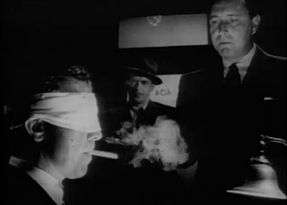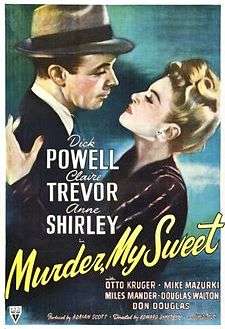Murder, My Sweet
| Murder, My Sweet (Farewell, My Lovely) | |
|---|---|
|
theatrical release poster | |
| Directed by | Edward Dmytryk |
| Produced by | Adrian Scott |
| Screenplay by | John Paxton |
| Based on |
Farewell, My Lovely (1940 novel) by Raymond Chandler |
| Starring |
Dick Powell Claire Trevor Anne Shirley |
| Narrated by | Dick Powell |
| Music by | Roy Webb |
| Cinematography | Harry J. Wild |
| Edited by | Joseph Noriega |
| Distributed by | RKO Pictures |
Release date |
|
Running time | 95 minutes |
| Country | United States |
| Language | English |
Murder, My Sweet (released as Farewell, My Lovely in the United Kingdom) is a 1944 American film noir, directed by Edward Dmytryk and starring Dick Powell, Claire Trevor, and Anne Shirley.[2] The film is based on Raymond Chandler's 1940 novel Farewell, My Lovely. A second film adaptation of the novel was made in 1975 and released under Chandler's title.
Murder, My Sweet turned out to be Anne Shirley's final film. She retired from acting in 1944 at age 26.
Plot
Temporarily blinded with his eyes bandaged, private detective Philip Marlowe (Dick Powell) is being interrogated by police lieutenant Randall (Don Douglas) about two murders.
He tells how he was hired by menacing Moose Malloy (Mike Mazurki) to locate Velma Valento, a former girlfriend, whom Moose lost track of while serving eight years in prison. They go to the night club where Velma last worked as a singer but the owner died years before and no one remembers her. Marlowe tracks down Jessie Florian (Esther Howard), the alcoholic widow of the night club's owner 8 years ago, who claims not to know what's become of Velma. However Marlowe finds a photo of Velma she hid from him, and she then says Velma is dead. Later, from a safe distance, Marlowe observes a clearly disturbed Jessie make a phone call.
The next morning the suave Lindsay Marriott (Douglas Walton) turns up at Marlowe's office, offering $100 if Marlowe will act as his bodyguard when he goes to a secluded canyon at midnight as a go-between to pay a ransom for some stolen jewels. In the canyon, Marlowe is knocked unconscious. Marlowe comes to when, in a delirious state, he sees a young woman shine a flashlight on his face and run away. The money is gone and Marriott has been viciously killed. When Marlowe reports the murder, the police make the mistake of asking him if he knows a Jules Amthor and warn him not to interfere in the case.
Posing as a reporter, Ann Grayle (Anne Shirley) tries to pry information out of Marlowe about the murder. She mentions that the jewels were jade and he sees through her. She introduces him to her wealthy father (Miles Mander) and his seductive second wife Helen (Claire Trevor). Grayle collects rare jade and was attempting to recover a necklace worth $100,000, robbed from Helen while she was out dancing with Marriott. Jules Amthor (Otto Kruger), a psychic healer who treated both Helen and Marriott, shows up just as Marlowe is leaving. Helen retains Marlowe to try to recover the jade but Anne tries bribing him off to keep out of it.
Moose Malloy forces Marlowe to go with him to "meet somebody," who turns out to be Amthor. Marlowe suspects that Amthor and Marriott were in league, setting up Helen to get the jade, but something went wrong with the plot. Amthor duped Moose into doing his dirty work. Amthor has Marlowe beaten up and drugs him for three days, trying to find out where the necklace is, but Marlowe escapes and tells Moose how he has been tricked. Marlowe goes to Ann and realizes she was the young woman who shone the light on his face after he discovered Marriott's body. They find a mutual attraction in each other. When the police ask Ann's father about the family beach house, which Marriott rented, Marlowe goes there.
Helen is hiding at the beach house from the police. Marlowe deduces that she hired him only to set him up for Amthor's interrogations, and that Ann was trying to save him from the set-up with her bribe. Helen attempts to entice Marlowe into helping her murder Amthor, who is blackmailing her, by luring him back to the beach house the next night for the necklace. Although suspicious, Marlowe goes along but finds Amthor dead, his neck snapped by a strong pair of hands. Moose is waiting for Marlowe at his office. Marlowe shows Moose the photo he took from Jessie, and as he suspected, it is a fake intended to throw anyone looking for Velma off the track. Marlowe tells Moose to lay low until the next night, when he will take Moose to Velma.
At the beach house, Marlowe has Moose wait outside while he meets with Helen, who is really Velma, to find out what happened to the necklace but she pulls a gun on him. She faked the robbery and the ransom to kill Marlowe after being tipped off by Jessie that he was looking for Velma. She killed Marriott while Marlowe went down into the canyon and was about to kill Marlowe when Ann came along, worried that her jealous father might be trying to kill Marriott. As Helen is about to shoot Marlowe, a lovesick Grayle shows up with Ann. He takes Marlowe's gun and kills Helen. Moose hears the shot and finds his Velma lying dead. Enraged, Moose lunges for Grayle, who shoots him. Marlowe attempts to intercede as the gun goes off and is blinded by the flash. Three more shots are fired.
His story concluded, the blinded private eye is told that Moose and Grayle shot each other in a struggle for Marlowe's gun. Marlowe is escorted out of the building by Detective Nulty (Paul Phillips), not realizing that Ann was also there, overhearing every word, and expresses his attraction for her to the detective. In the back seat of a taxi cab, the bandaged Marlowe recognizes her perfume and they kiss.
Cast
|
|
Release and title change
The film was first screened on December 18, 1944 in Minneapolis, Minnesota with the title Farewell, My Lovely. It opened in New York City, however, on March 8, 1945, as Murder, My Sweet.[3]
Dick Powell was previously known (1930s and early 1940s) for light comedies and musicals, so the casting of him as Chandler's hard-boiled private detective antihero was a surprise to audiences. The studio executives changed the title from Farewell, My Lovely because they believed audiences would think the film was a musical. Powell's performance is much debated by fans of Chandler and film noir; some think it too light and comic; others consider it the best interpretation of Philip Marlowe on film.[4]
Response
Critical reception

Murder, My Sweet is considered one of the best Chandler adaptations. Glenn Erickson, in a recent review of the film, wrote, "Murder, My Sweet remains the purest version of Chandler on film, even if it all seems far too familiar now."[5]
Alison Dalzell, writing for the Edinburgh University Film Society, notes:
Of all the adaptations of Chandler novels, this film comes as close as any to matching their stylish first person narrative and has the cinematic skill and bravado of direction to carry it off. Since the '40s countless mystery and neo-noir films have been made in Hollywood and around the world. Murder, My Sweet is what they all aspire to be.[6]
According to film critics Ellen Keneshea and Carl Macek, the picture takes Chandler's novel and transforms it into a "film with a dark ambiance unknown at [the] time." Dymytryk was able to transcend the tough dialogue and mystery film conventions by creating a "cynical vision of society." As such, the film enters the world of film noir.[3]
When the film was released Bosley Crowther, the film critic for The New York Times, appreciated the adaptation of Chandler's novel and lauded the acting, writing:
Practically all of the supporting roles are exceptionally well played, particularly by Mike Mazurki, the former wrestler, as the brutish Moose Malloy; Otto Kruger as Jules Amthor, quack-psychologist and insidious blackmailer; Anne Shirley as an innocent among the wolf pack, and Don Douglas as the police lieutenant. In short, Murder, My Sweet is pulse-quickening entertainment.[7]
The staff at Variety magazine also gave the film kudos, writing:
Murder, My Sweet, a taut thriller about a private detective enmeshed with a gang of blackmailers, is as smart as it is gripping ... Performances are on a par with the production. Dick Powell is a surprise as the hard-boiled copper. The portrayal is potent and convincing. Claire Trevor is as dramatic as the predatory femme, with Anne Shirley in sharp contrast as the soft kid caught in the crossfire.[8]
Box office
The film made a profit of $597,000.[9]
Awards and honors
Murder, My Sweet won 1946 Edgar Awards from the Mystery Writers of America for:
- Best Motion Picture
- John Paxton (screenplay)
- Raymond Chandler (author)
- Dick Powell (actor)
- A special scroll to RKO Pictures[10]
Other versions
The Chandler novel had been filmed once before, in 1942, as The Falcon Takes Over, directed by Irving Reis, part of a film series which featured George Sanders as The Falcon.[11] In 1975 the story was remade as Farewell, My Lovely, featuring Robert Mitchum as Marlowe and directed by Dick Richards.[12]
The film version of Murder, My Sweet was dramatized as an hour-long radio play on the June 11, 1945 broadcast of Lux Radio Theater, with Powell and Trevor in their original film roles. In 1948, Hollywood Startime presented a radio version with Powell returning in his role and Mary Astor as the leading lady.[13]
See also
References
Notes
- ↑ "Murder, My Sweet: Detail View". American Film Institute. Retrieved April 27, 2014.
- ↑ Crowther, Bosley (March 9, 1945). "Murder, My Sweet". The New York Times. Retrieved October 24, 2014.
- 1 2 Silver, Alain and Elizabeth Ward, eds. Film Noir: An Encyclopedic Reference to the American Style, cast and crew section of Murder, My Sweet article by Ellen Keneshea and Carl Macek, page 192, 3rd edition, 1992. Woodstock, New York: The Overlook Press. ISBN 0-87951-479-5.
- ↑ Clute, Shannon and Richard Edwards. Out of the Past: Investigating Film Noir, Episode 26: Murder, My Sweet. Last accessed: December 13, 2007.
- ↑ Erickson, Glenn. DVD Savant Review, film analysis, 2007. Last accessed: December 13, 2007.
- ↑ Dalzell, Alison. Edinburgh University Film Society, film review. 1997. Last accessed: December 13, 2007.
- ↑ Crowther, Bosley. The New York Times, film review, March 9, 1945. Last accessed: December 13, 2007.
- ↑ Variety review of Murder, My Sweet, March 8, 1945.
- ↑ Richard B. Jewell, Slow Fade to Black: The Decline of RKO Radio Pictures, Uni of California, 2016
- ↑ "Awards" on IMDB.com
- ↑ The Falcon Takes Over on IMDb.
- ↑ Farewell, My Lovely on IMDb.
- ↑ "Pop Culture 101: Murder, My Sweet". Turner Classic Movies. Retrieved September 20, 2014.
External links
| Wikiquote has quotations related to: Murder, My Sweet |
| Wikimedia Commons has media related to Murder, My Sweet. |
- Murder, My Sweet at the American Film Institute Catalog
- Murder, My Sweet on IMDb
- Murder, My Sweet at Rotten Tomatoes
- Murder, My Sweet at AllMovie
- Murder, My Sweet at the TCM Movie Database
- Murder, My Sweet film clip on YouTube
- Streaming audio
- Murder, My Sweet on Lux Radio Theater: June 11, 1945
- Murder, My Sweet on Hollywood Star Time: June 8, 1946
